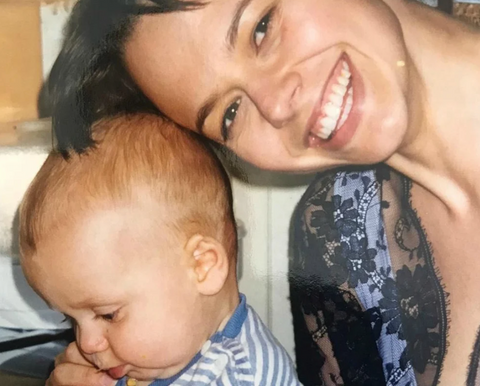Dear Therapist: Can I Cut my Mom off from My Children if she won’t seek therapy?
Originally posted by Lori Gottlieb for the Atlantic on 30 January 2023
Dear Therapist,
My husband and I are planning to have children in the very near future, and I have concerns about my mother’s ability to be a positive influence in their lives. Is it inappropriate to ask her to see a therapist as a condition for being present in the lives of my children?
My mother is often emotionally immature, reactive, and self-centered. When we have a difference of opinion, she views it as a personal judgment. My parents, who are still married, live several states away, and I currently limit contact with my mother. I see her on holidays and call her once a month. I’m closer with my father.
Growing up, I was heavily parentified by my mother; my father tried to stop this, but was largely absent. My father has matured as he has aged, and sincerely wishes he had done better in many areas. My mother cannot handle any conversation that alludes to her less-than-perfect motherhood, and has not matured since my childhood.
I’ve worked hard in therapy to heal my own wounds, and I already feel immensely protective of my future children. I am concerned that my mother will be a harmful presence for them, and that she will disregard my parenting plans and do as she wishes (this is a frequent pattern in our relationship). She was a kindergarten teacher for years, so views herself as an expert on childhood matters. But she lashes out when she doesn’t get what she wants; name-calling and belittling are still part of her repertoire. She is deeply insecure and has an unhealthy relationship with food and her body, which wasn’t fully responsible for my 15-year battle with anorexia, but certainly added fuel to my fire. I don’t want any of this around my children.
At the same time, my mother loves children and has endless energy. She dreams of being a grandmother, and can be tender and kind with little ones. She instilled a love of reading in me by reading to me each night. In many ways, her childlike nature would make her an incredible grandmother.
Is requesting that she do some therapeutic work of her own too much, or is this a reasonable demand?
Sincerely,
Anonymous
Dear Anonymous,
You sound like you’re already on the path to becoming the kind of mother you deserved to have. You’ve worked hard to heal through therapy, and you’re being intentional about how you want to parent. By doing all of this, you’re already protecting your future children.
However, motherhood—or even the anticipation of it—often brings to the surface old childhood wounds. When this happens, it’s important not to let the helplessness you felt when you were young distort the fact that, as an adult, you have agency that allows you to protect yourself more effectively.
I say protect yourself because the best way to protect your children is to be a sturdy presence that makes them feel safe. Your mother going to therapy is not the thing that will determine whether they have a healthy, happy childhood; it’s the confidence you have in your role as their parent.
Before I get to what that looks like, a quick word about giving someone a therapy ultimatum: Therapy can help people only if they’re motivated to change. In order to be motivated to change, a person needs to see that there’s a problem. Your mother doesn’t seem open to that possibility; by your account, she hears feedback as criticism, and lacks willingness to consider other perspectives. Therefore, even if she acceded to your “demand” to seek therapy so she could see her grandchildren, she’d likely spend her time there complaining about you rather than looking inside herself. The bottom line is: You can (sometimes) coerce someone to go to therapy, but you can’t force them to grow.
The good news, though, is that there’s a difference between blackmail and boundaries—and that’s where your agency as a parent comes in. You get to decide what behavior is acceptable and what isn’t now that you’re an adult and are free from your parents’ control.
You can start setting the stage for your boundaries by sharing some general expectations in a letter. Because your mother might feel singled out if you address this only to her, I suggest addressing it to both of your parents. And keep in mind that most people respond best to hearing what you like about them and want more of. So your letter might go something like this (let’s call you Jill and your husband Jack):
Dear Mom and Dad,
I have some exciting news, and because Jack and I are giving so much thought to this, I want to share it with you in this letter. We’re planning for children in the very near future, and we can’t wait to experience parenthood! Jack and I have also been talking a lot about the kind of family we’d like our kids to grow up in, and I thought I’d share that with you both too.
One thing that’s important to us is that our children have close and enjoyable relationships not just with us, but also with the rest of the family. We know that you’ll both be incredible grandparents, and our kids will be so lucky to have you. Mom, I know how much your students adored your kindness, abundant energy, and sense of childlike fun. To this day I still treasure our time reading together when I was growing up, and I attribute my love of reading to you. Dad, the open conversations we’ve had have really moved me. Jack and I feel so grateful that our children will get all of this and more from loving grandparents.
Jack and I are also looking forward to growing into our roles as parents and figuring out what works best for our family. We know that you have valuable opinions, but we’ve decided that it’s important for us to find our own way. We will, of course, ask you for guidance if we feel we need it. I know, too, that we’ve had our differences, but I really want our children—your grandchildren—to see us, the adults, all get along well, modeling warm, healthy family relationships for them. I’m sure you want this too, so I know we’re on the same page. But I mention this because I’m asking that if we do have any tension between us (and what family doesn’t?), we have patience, give each other the benefit of the doubt, and, above all, discuss whatever the issue is respectfully and away from the kids.
These are just some initial thoughts as we get ready to move forward, so it might sound premature, but I’m so excited that we’re planning this and I wanted you to be among the first to hear what we’re thinking.
It means the world to us that we have your support in our goal of family harmony as we become parents. Get ready to be called Grandma and Grandpa!
Love, Jill
Notice that this letter highlights the attributes you genuinely value and hope your parents will share with your children, and sets the stage in a big-picture way for the dynamic you want your growing family to have: one where your autonomy as parents is respected, and everyone prioritizes family harmony. It might feel insufficient to you because it doesn’t address your more specific concerns, such as name-calling, belittling, and your mom’s relationship with food. Nor does it outline the pain they caused you. That’s because bringing those things up is likely to be counterproductive—your mom might not be able to really hear you, and your dad might be too conflict-avoidant to back you up. I suspect they’ll be more likely to absorb a message that puts you all on the same team and steers them toward the positive behaviors you want, because they won’t be on the defensive.
The second phase of boundary-setting will happen once your kids are here. For instance, if your mom lashes out when she feels judged, you can remind her that it’s very important to you that the adults model respect for one another and that you’re happy to discuss the issue privately. You can let her know that name-calling isn’t something you allow in your house—not to you, your husband, or your kids. If it continues, you can let her know, with kindness, that unless she’s able to avoid name-calling or criticism, you’re going to pause on the visits, but will be happy to resume them when this request is met.
Still, not every instance of bad behavior by your mom has to mean that you step back from the relationship. If she talks about food or her body in ways you don’t like, you can explain why you’d prefer she not do that, but it may not be a reason to keep your kids away from her. Remember, your children are not you—they have you as a mother, someone with self-awareness who has worked hard on her own issues. So if your mother makes her usual comments, that’s a great opportunity to talk with your kids about the different ways in which you and their grandmother think about food and bodies.
The point is that as you grow into parenthood, you’ll start to see that as much as you’d like to, you can’t protect your kids from the world—they’ll be exposed to all kinds of views, opinions, and personality types. The key difference between your childhood and the one your kids will have is that they’ll be able to learn from the way you handle situations with a maturity that your parents didn’t and perhaps still don’t have. Although cruelty is never okay, it’s not the worst thing in the world for your kids to see some of your mother’s more immature behavior, because they will witness you kindly setting boundaries, and develop the capacity to understand people as not all good or all bad. They’ll learn early on that you can enjoy someone’s attributes while also finding some of their habits annoying.
In the end, it won’t matter whether your mom goes to therapy or not. What will matter to your children is that you have—because you, not your mom, are the one raising them.
 Free personalisation
Free personalisation Free UAE shipping on orders over AED 450
Free UAE shipping on orders over AED 450 Free Gift Wrap with Gift Sets
Free Gift Wrap with Gift Sets

